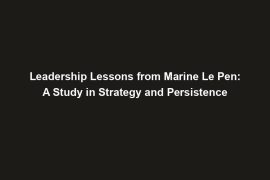Hey there, history buffs and leadership enthusiasts! Today, we’re diving into the fascinating world of Louis XV, the King of France whose reign was filled with intrigue, challenges, and plenty of leadership lessons for us to unpack.
Louis XV’s time as king was a rollercoaster of events, from wars to political turmoil, all of which shaped his leadership style and decision-making process. But why should we care about a king who ruled centuries ago? Well, studying historical leaders like Louis XV can actually provide us with valuable insights and lessons that can be applied to modern leadership practices.
So, in this blog post, we’re going to explore the leadership style of Louis XV, dissecting how his approach to leading a nation influenced the outcomes of his decisions. We’ll also draw comparisons between Louis XV’s leadership style and modern leadership theories and practices, seeing how they stack up against each other.
By the end of this post, you’ll walk away with a deeper understanding of Louis XV’s leadership style and the lessons we can learn from his reign. So buckle up, grab a cup of coffee, and let’s dive into the world of historical leadership with Louis XV as our guide. Get ready to be inspired and empowered to elevate your own leadership practices!
Leadership Style of Louis XV
Now that we have a better understanding of Louis XV’s reign as King of France, let’s delve into his leadership style and characteristics. Louis XV was known for his passive and indecisive approach to ruling, often delegating important decisions to his advisors and ministers. He lacked the assertiveness and charisma that are typically associated with effective leaders, leading to unrest and instability during his reign.
Despite his shortcomings, Louis XV did possess some key leadership qualities that impacted his rule. His ability to navigate complex political landscapes and maintain diplomatic relationships with other European powers allowed France to avoid major conflicts during his reign. However, his reluctance to address internal issues within the country ultimately contributed to the decline of the monarchy.
Analysis of Louis XV’s Leadership Style
When we compare Louis XV’s leadership style to modern leadership theories, we can see both similarities and differences. While his passive approach may not align with contemporary notions of strong and assertive leadership, his diplomatic skills highlight the importance of effective communication and relationship building in leadership roles. By analyzing Louis XV’s decisions and their outcomes, we can gain valuable insights into the significance of leadership style on a leader’s effectiveness and legacy.
By studying historical leaders like Louis XV, we can gain a deeper understanding of the complexities of leadership and the various factors that can influence a leader’s success or failure. As we continue to explore the lessons learned from Louis XV’s reign, we can begin to apply these insights to our own leadership practices to become more effective and impactful leaders in today’s world.
Lessons for Modern Leaders
So, we’ve delved into the leadership style of Louis XV and examined how it influenced his reign as King of France. But what can modern leaders like you and me learn from his example? Let’s break it down.
Identifying Key Lessons
One of the key lessons we can draw from Louis XV’s reign is the importance of adaptation. Louis XV struggled to adapt to the changing times and shifting political landscape, ultimately leading to a decline in his leadership effectiveness. Modern leaders must be able to recognize when their current strategies are no longer working and be willing to pivot and try new approaches.
Another crucial lesson is the significance of building strong relationships and alliances. Louis XV’s lack of strong connections with his advisors and nobles left him vulnerable to political challenges. In today’s world, leaders must cultivate a network of trusted advisors and collaborators to navigate complex issues and make informed decisions.
Applying Lessons to Leadership Practices
Now that we’ve identified these lessons, how can we apply them to our own leadership practices? It’s essential to regularly assess our strategies and tactics, ensuring that they remain relevant and effective. We can also prioritize relationship-building, fostering trust and collaboration within our teams to drive better outcomes.
By learning from historical leaders like Louis XV, we can gain valuable insights into effective leadership strategies and tactics that can be applied in contemporary contexts. So, let’s reflect on these lessons and consider how we can incorporate them into our own leadership approach.
Significance of Learning from Historical Leaders
Studying historical leaders like Louis XV not only provides us with a newfound appreciation for the complexities of leadership, but also equips us with practical lessons that can enhance our leadership skills. By learning from the successes and failures of the past, we can better navigate the challenges of the present and strive towards becoming more effective leaders.
So, next time you’re faced with a leadership dilemma, remember the lessons of Louis XV and how they can inform your decision-making process. Embrace the wisdom of the past to shape a more successful future in your leadership journey.
Are you ready to apply these lessons to your own leadership practices? Let’s take a step towards becoming better leaders, one historical lesson at a time!



